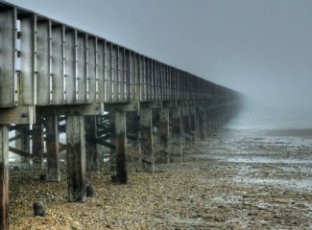Desperate prayers
In Late October, as the “perfect storm” that was Hurricane Sandy came barreling toward the northeast coast, my wife and I were in Atlanta watching the Weather Channel with mounting concern. Our cherished home on the Chesapeake Bay, the place of our sabbath rest and treasured summer memories, was almost directly in the path of the tempest. As the predictions of destruction grew dire, I found myself uttering an involuntary prayer, “No, God— please, no!”
This was not a mature prayer; I knew that immediately. After all, we were safe, miles away from danger, while millions of people were actually in harm’s way. And here I was uttering a hoarse and self-serving plea for a house. How could I do that, even reflexively? When the morning light revealed that our home was undamaged, any smug thought that my prayers were answered was completely undone by horrific news footage of death and devastation in the land.
Read our latest issue or browse back issues.
Some would say that my prayer was not only selfish but downright naive. The very idea that God might somehow act in the middle of a natural disaster is a relic of a primitive worldview. Pat Robertson may try to steer hurricanes with prayer, but thoughtful people of faith do not. When Texas governor Rick Perry asked citizens to pray for rain in the midst of the drought, a Dallas newspaper asked ministers what they thought. One pastor opined that while such praying might widen the compassion of those who pray, it was silly to believe that God might be somehow be affected. “By now,” said the pastor, “it is my hope that we . . . have evolved beyond asking the rain gods to pour down upon us.” If you really want to change the weather, he said, work on environment issues.
I get that. Crying out to God in the midst of a drought or a hurricane without also doing what we can to control greenhouse gases can be empty piety. But I also wonder if a zeal for human action without a meaningful understanding of prayer is simply a kind of functional atheism.
In her essay “God of Power and Might,” Cambridge theologian Janet Martin Soskice suggests that contemporary problems with intercessory prayer include the assumption that prayers are addressed to a Wizard of Oz kind of God, a divine “occasional fixer.” This is “a God who would strike York Minster with lightning, a God who could be cajoled or flattered by intercessory prayer” to reach into the natural order and make adjustments.
But this is not, argues Soskice, the God of the Christian tradition, the God of Augustine, Anselm and Aquinas. This divine fixer, who stands outside of creation ready to intervene when summoned, was ironically both demolished by the Enlightenment and invented by it. The God of Christian faith, says Soskice, is not merely one force among others, one creature—albeit more powerful—among other creatures, and God’s power is not “a tinkering with the causal order” but instead “the holding of the whole in being, in overwhelming, all-giving love.”
And what if God created a world, Soskice goes on to ask, “in which a man was raised from the dead or in which intercessory prayers were efficacious?” Then prayer and resurrection would not be interruptions of creation or external divine manipulations but a part of God’s “eternal act of creation.”
The thought is profound. Resurrection and prayer are not violations of the so-called laws of nature but are woven into God’s ongoing act of creation, as fully as gravity or the tides. Our intercessions, then, far from being naive, are a participation in the very life of the ever-creating God. God, as the psalmist says, is “enthroned on the praises of Israel” and sustains the world in part through the prayers of the faithful.
But what about foolish prayers, trivial prayers and selfish prayers? Karl Barth is comforting here. “We do not know what proper prayer is,” he admits, and it is actually a sign of our faith that we run to God in prayer with “haste and restlessness.” To do so reveals a trust that we are in communion with God, who intercedes for us with sighing too deep for words, who hears and answers prayers “quite apart from our weakness or strength, our ability or inability to pray.” In prayer, said Barth, we stand beside God as friends.
So when we are in distress or need, we cry out to God in prayers born of friendship. Fretting about whether such prayers of desperation are worthy— whether they are for rain, for the sparing of a house or that our child might not be lonely and left out at school— may be a misplaced anxiety, as well as a touch of hubris, as if a wrongful prayer from our lips could send a robotic God careening out of control. We are not God, and the wisdom of God will not be compromised by our foolish cries.
Indeed, every prayer is silently surrounded by the deepest prayer of all: “Not my will but yours be done.”







